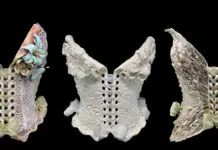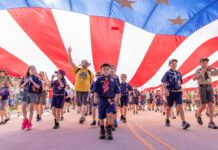Stillwater’s Alicia Payne Murie suffered a traumatic brain injury (TBI) in high school. She battled her way back from a coma and attended Rose State College. While there she extensively researched TBI and began an international online club, TBI Raiders, to share her findings. Now Murie is bringing TBI Raiders and TBI awareness to the real world, with the hope of one day creating a national organization able to make a difference in the lives of those with TBI.
Oklahoma Magazine: What was your experience with TBI?
Alicia Payne Murie: When I was 16 years old, I was broadsided by a car, traveling at 60 miles per hour, on the driver’s side. I received a left-right traumatic brain injury, which is the deadliest form of TBI.
OM: Where did you go from there? What set you on the path to found the TBI Raiders?
AM: A lot of things. I went to Rose State College. I was there for four years and one semester. That was making up for high school, because I couldn’t remember it. Only bits and pieces.
OM: Lost memories?
AM: I sort of know what high school was like. But I can’t remember any details.
OM: What inspired you to found TBI Raiders?
AM: In the summer of 2001, I created a website, TBI Corner. It was filled with information about kindergarten through 12th-grade kids and TBI. After that, I talked with a friend about how more needs to be done to help college students with TBI. There was nothing for us. We just get lumped into other disability categories, and people expect that they’ll fit us. In January 2002, I was taking classes in HTML, digital imaging, and some other web stuff. And I was already teaching myself about web design. I started up a website, and we established TBI Raiders, an online club to help college students with TBI.
OM: You named your organization the TBI Raiders. Where does the “Raiders” come from?
AM: Rose State’s mascot is the raider. When we were trying to think of a name, we wanted a “sports” name. We needed to have something of our own. Instead of just a plain old organization, we wanted to be kind of like a sports team. And we’re pretty much “raiding” across the nation to educate everybody about TBI.
OM: We’re pretty clear about what students with other disabilities need. What’s something a student TBI survivor needs?
AM: One key thing has to do with testing. When I was at Rose State, a history professor wouldn’t use multiple choice tests. You have to do a lot of memorizing for fill-in-the-blank tests. The professor wouldn’t accommodate me whatsoever. Up until about a month before the finals, I was making an F on every test. And then when he finally started accommodating me, I started making As and Bs.
OM: Give me an example of an effort that TBI Raiders is making to create some awareness about TBI out there.
AM: In the summer of 2004, I went to Washington, D.C. to represent Oklahoma Youth With Disabilities. There are a whole lot of misunderstandings between those with disabilities and those without disabilities. People make so many assumptions about each other. I’m recruiting students with and without disabilities and young adults with TBI. They can learn from each other. The students without disabilities can see that the only thing really separating them from those with TBI is just that we have more limitations than them. That’s all.
OM: What’s in store for TBI Raiders?
AM: There are a bunch of things I want to see happen in 10 years. We’re building a national nonprofit out of TBI Raiders. There are at least six states interested in creating a chapter of TBI Raiders. I would like to see a foundation established. We’ve got so many budget crises, and everybody’s having trouble getting funding for this and that. The foundation would provide funding for disability projects and grants, TBI scholarships, schools, hospitals and so on. I want to create a national scholarship for a traumatic brain injury survivor.

























